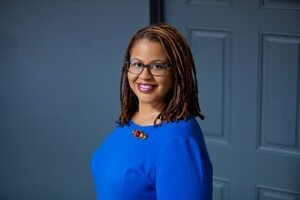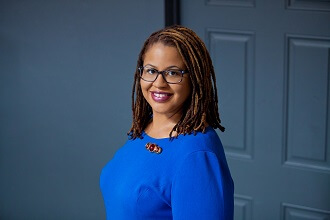An Interview with Raël Nelson James, Director of Diversity, Equity, and Inclusion, Bridgespan
Raël Nelson James knows the importance of maintaining relationships and keeping in touch. In this interview, she shares which book she considers a “testament to the resiliency of Black people,” lifts up philanthropy’s inescapable connection to the origination of wealth and wealth inequality, and explains why she doesn’t spin her wheels trying to convince people that racism is real.
Raël Nelson James, Director of Diversity, Equity, and Inclusion, The Bridgespan Group
I do it for the culture.
If there was a headline for your leadership journey throughout your career, what would it be?
I think it’s something about serendipity, or that in retrospect it all makes sense. I tried to pursue my passions and interests and was  intentional where I could be. I find beauty in serendipity and how the universe can bend in your favor when you cultivate relationships and when you are in the right place at the right time. The last four jobs I’ve gotten are a result of relentless focus on keeping in touch. (Raël Nelson James pictured at right.)
intentional where I could be. I find beauty in serendipity and how the universe can bend in your favor when you cultivate relationships and when you are in the right place at the right time. The last four jobs I’ve gotten are a result of relentless focus on keeping in touch. (Raël Nelson James pictured at right.)
An example of serendipity that comes to mind is from the beginning of my career. I was working at Operation Understanding DC (OUDC), which was a two-person organization. When thinking about the next steps in my career, I wondered what skills my boss had that I didn’t. I was interested in continuing to work with high school students so applied to KIPP DC for a KIPP To College role, and went in for a series of interviews. During the last interview, I met with Susan Schaeffler and she told me I did not have enough experience to be a supervisor for this role. She informed me there were three other opportunities open and told me to take a look at those and follow up if any interested me. One was for a development associate, which launched me into nonprofit leadership. I think of that moment often. I knew that development was a skill I was lacking but something I was interested in. That role was really meaningful to my career trajectory.
What are some of your career highlights?
Definitely Operation Understanding DC. I really love that program. It was also a full-circle job moment for me since I was a student in OUDC when I was in high school then served as program director for about five years. OUDC works with Black and Jewish high school students and explores race, religion, culture, and history. I continue to believe in the power of really re-teaching history as a way for young people, particularly people of color, to understand and step into our power. Students spend the summer on a journey that follows the path of the 1961 Freedom Rides and along the way meet with foot soldiers from the Civil Rights Movement. There’s a realization in Greensboro, NC that the students who started the sit-in movement that fundamentally changed our country are only two years older than the participants are at the time. The traditional framing of history as focused on charismatic leaders instead of grassroots activists makes it feel like individuals have no power to create movements. A real highlight was watching students’ eyes being opened; those aha moments where the power of individuals and the power of movement building meet, and young people realize how they can play a role in that. I find I draw upon my OUDC experience quite a bit in my work on Bridgespan’s focus on racial equity, and it’s a highlight of my current role.
What are your favorite types of challenges?
Something that I get to do a lot of now is mentorship. I really love helping people at the beginning of their career to make sense of things that were hard for me. I enjoy working through challenges with other people.
I also enjoy making small or big refinements that change the trajectory of the place I’m in. Maybe you won’t serve the longest tenure at every place you work, but there are those lightning-rod moments that change the trajectory of organizations. It’s like when a dam in a river changes the trajectory of water flow. I enjoy infusing my points of view in places that feel meaningful in that way.
What is one book that was meaningful or influential in your development as a leader?
I’m not really big on non-fiction, though I do follow long-form articles and pieces on diversity, equity, and inclusion; I’m the daughter of two actors and most everyone in my family is an artist so fiction is my real love.
I’ll mention one nonfiction book that I found meaningful: Parting the Waters: America in the King Years 1954-63 by Taylor Branch is about the Civil Rights Movement and how individuals can shape catalytic change.
Another powerful book is Homegoing by Yaa Gyasi, which is about two sisters in Ghana separated during the transatlantic slave trade. One stays in Ghana and the other is transported via the Middle Passage. It toggles chapter by chapter through enslavement and Reconstruction and is a sweeping work of fiction; a testament to the resiliency of Black people that inspires me daily.
Work in the social sector can be very personal and linked to one’s values. Can you think of a time when your values were in tension during your career and how you reconciled that tension or not?
One of the things that I think is really interesting working in the nonprofit sector is its intersection with philanthropy. I benefited from financial aid and programs growing up that were funded by philanthropy. My life transpired in a way to make me an exception to others that I grew up with, and I believe creating these kinds of opportunities remains important. I also believe that it’s fundamentally inadequate to focus solely on creating exceptions. The sector is grappling with this, but it often seems that it’s not with the same urgency that I feel. People still think it’s okay to apply a band-aid rather than a fix. Philanthropy has an inescapable connection to the origination of wealth and wealth inequality. It makes me wonder whether you can you do good and do well at the same time. I sometimes think about that more acutely than at other times. I’ve worked at nonprofits that were chronically underfunded, where colleagues lived paycheck to paycheck. Don’t those of us who work in non-profits deserve nice things too? And to make money and feel secure in our futures?
Summer 2017, Democratic Representative Maxine Waters coined the phrase, “reclaiming my time,” as she thwarted Treasury Secretary Steven Mnuchin’s attempts to waste her time with nonsense. Can you share an experience in the workplace where you have had to reclaim your time? What was the context? How did you navigate it? What was the outcome?
I do a lot of expertise requests on how to get started on one’s diversity, equity, and inclusion (DEI) journey. One thing people always want to know is how to convince skeptics or detractors to get on board with the journey and move towards shared equity goals. This is an example of where I don’t spend my time. It’s better to spend time with passionate pioneers and early adopters, rather than spin your wheels trying to convince people that racism is real. There are analogs about early adopters creating culture change that I find compelling when applied to DEI work.
What’s your approach to self-care? Are there any rituals you use to survive and thrive?
That I need to be better at it! It goes back to the stigma of folks in the nonprofit sector thinking we don’t deserve anything. I struggle with that. My team and colleagues are essential to me succeeding. I count on them for optimism when things get sticky.
I have an interesting relationship with social media. I need to be really thoughtful about staying connected to people. I moved to New York, but most of my network is in Washington, DC. I take lots of trips home and visit people. I make time for people.
I get weekly massages.
I read and pay attention to people in the world who inspire me and remind me of the power of Black women and people of purpose.
What advice would you offer other Black women trying to develop or amplify their voice and become self-advocates?
It’s a lot of pressure to be one of a few people in the room and know to some extent that you’re judged both for yourself and as a representative of people like you. I remember seeing a Tweet from Kamala Harris two or three months ago that said, “My advice to Black girls everywhere: whenever you find yourself in a room where there aren’t a lot of people who look like you — be it a classroom, or a boardroom, or a courtroom — remember that you have an entire community in that room with you, all of us cheering you on.” It’s important to remember that though they are not physically present, there are supporters: girlfriends, family members, friends, colleagues – and those from generations before who would be thrilled to see how far we’ve come. When I have setbacks, I remember that my time and talents are my own and tomorrow is another chance to get it right.
Relationship building is the biggest piece of advice. You don’t know what investing in relationships might do for you or someone else; it never feels like waste of time to me.



Comment section